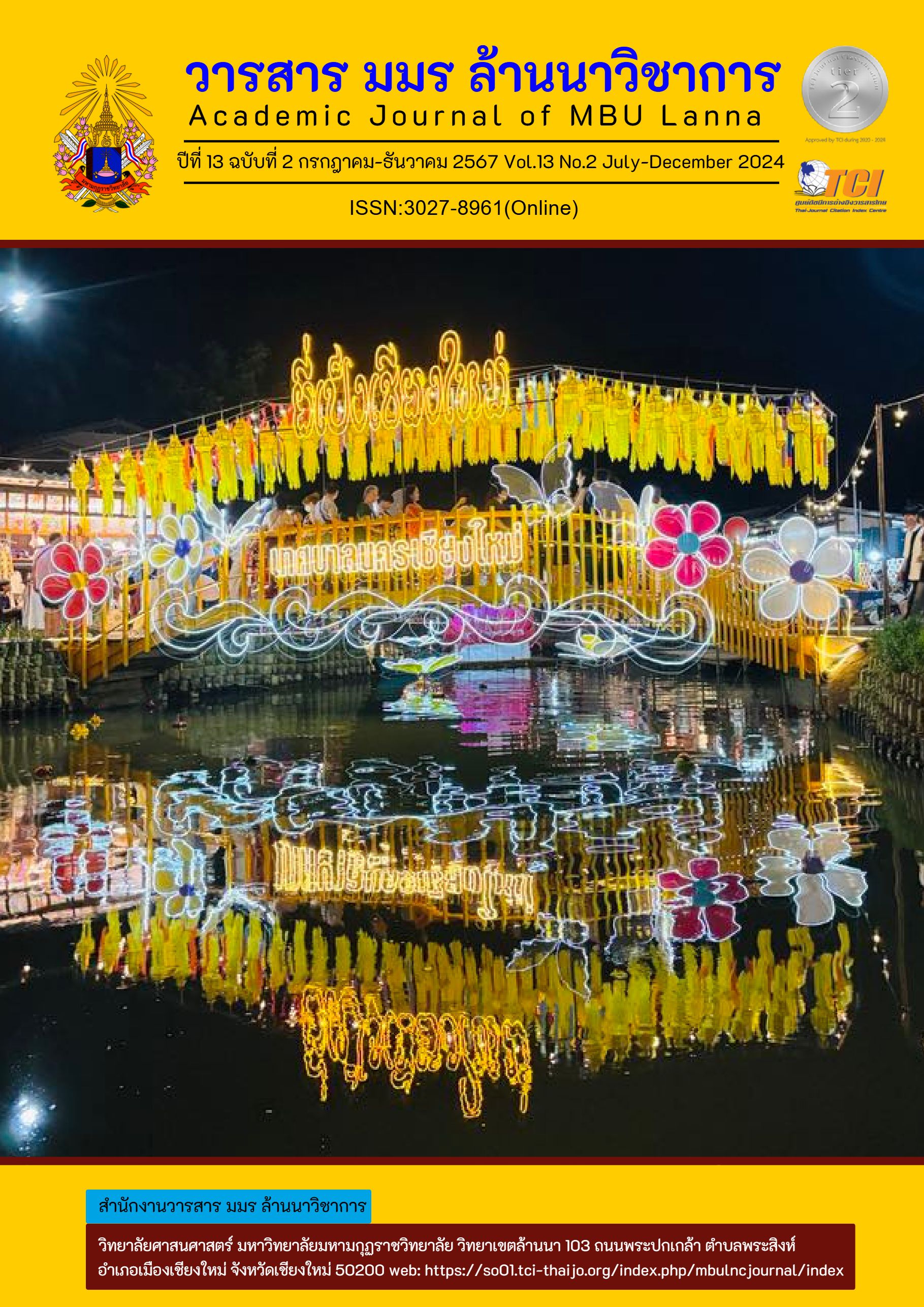Application of Buddhist Principles to Promote Public Participation in Waste Management of Duphong Subdistrict Administrative Organization Santisuk District, Nan Province
Keywords:
Application of buddhist principles, Public participation, Waste management, Du phong subdistrict administrative organizationAbstract
The objectives of this research were: 1) study the level of public participation in waste management 2) study the relationship between the 7 principles of imperishable truth and waste management 3) study the application of the 7 principles of non-perishable Dhamma to promote public participation in waste management of Du Phong subdistrict administrative organization, Santisuk district, Nan province, the research method was a combination of methods. data were collected from 362 samples using a questionnaire. The statistics used to analyze the data were frequency, percentage, mean, standard deviation and Pearson’s correlation coefficient. The qualitative research data were collected by in-depth interviewing 10 key informants using the interview script and analyzed by descriptive content interpretation.
The results of this research found that:
- The level of public participation in waste management is at a moderate level.
- The relationship between the 7 principles of imperishable morality and waste management has a positive relationship with statistical significance at the 0.01 level.
- The model of applying Buddhist principles to promote public participation in waste management consists of 5 parts: 1) knowledge is the search for knowledge to transform waste into a participatory model 2) innovation is the application of new knowledge or inventions to suit the context of the area 3) buddhist principles is the driving force of activities that have projects, formats, and community activities to manage waste with participation according to Buddhist principles from various activities 4) participation is the creation of joint power through cooperation in the community 5) evaluation is the evaluation of the results of the participatory waste transformation of Du Phong subdistrict administrative organization, Santisuk district, Nan province.
References
เกศี จันทราประภาวัฒน์ (2565). พุทธบูรณาการส่งเสริมประสิทธิผลการจัดการขยะของเทศบาลนครลำปาง[วิทยานิพนธ์ปริญญาดุษฎีบัณฑิต, มหาวิทยาลัยมหาจุฬาลงกรณราชวิทยาลัย]. MCU Digital Collections. https://e-thesis.mcu.ac.th/thesis/4699
เจริญชัย กุลวัฒนาพร (2563). รูปแบบการจัดการคุณภาพด้านสิ่งแวดล้อมโดยการบูรณาการหลักพุทธธรรมขององค์กรปกครองส่วนท้องถิ่น จังหวัดสมุทรปราการ [วิทยานิพนธ์ปริญญาดุษฎีบัณฑิต ไม่ได้ตีพิมพ์]. มหาวิทยาลัยมหาจุฬาลงกรณราชวิทยาลัย.
พระครูภาวนาโสภิต วิ (บุญญรัตน์ เมืองวงศ์). (2556). พุทธธรรมาภิบาล. สำนักพิมพ์รัฐพลการพิมพ์.
พระธรรมปิฎก (ป.อ. ปยุตฺโต). (2543). พจนานุกรมพุทธศาสตร์ ฉบับประมวลธรรม (พิมพ์ครั้งที่ 9). มหาจุฬาลงกรณราชวิทยาลัย.
พระนุชิต นาคเสโน (โพวิชัย). (2561). การมีส่วนร่วมของประชาชนในการบริหารงานกำจัดมูลฝอยของเทศบาลตำบลทุ่งหลวง อำเภอสุวรรณภูมิ จังหวัดร้อยเอ็ด [วิทยานิพนธ์ปริญญามหาบัณฑิต, มหาวิทยาลัยมหาจุฬาลงกรณราชวิทยาลัย]. MCU Digital Collections. https://e-thesis.mcu.ac.th/thesis/497
พระมาโนช สุทฺธจิตฺโต (ผุดผาด) (2565). รูปแบบการแปรรูปขยะให้เป็นพลังงานสะอาดแบบมีส่วนร่วมของชุมชน ตำบลตลาดจินดา อำเภอสามพราน จังหวัดนครปฐม [วิทยานิพนธ์ปริญญาดุษฎีบัณฑิต, มหาวิทยาลัยมหาจุฬาลงกรณราชวิทยาลัย]. MCU Digital Collections. https://e-thesis.mcu.ac.th/thesis/4510
ยุทธพงษ์ กัยวรรณ์, (2543). พื้นฐานการวิจัย. สุวีริยาศาสตร์.
รัฐพงศ์ บุญญานุวัตร. (2552). การมีส่วนร่วมในการพัฒนาชุมชนของประชาชนเขตดุสิต กรุงเทพมหานคร. มหาวิทยาลัยราชภัฎสวนสุนันทา.
ศิรินรักษ์ สังสหชาติ. (2557). การมีส่วนร่วมของประชาชนในการบริหารงานขององค์การบริหารส่วนตำบลบึงกอก อำเภอบางระกำ จังหวัดพิษณุโลก [วิทยานิพนธ์ปริญญาดุษฎีบัณฑิต ไม่ได้ตีพิมพ์].มหาวิทยาลัยมหาจุฬาลงกรณราชวิทยาลัย.
สำนักงานสภาพัฒนาการเศรษฐกิจและสังคมแห่งชาติ. (2565). แผนยุทธศาสตร์ชาติ ระยะ 20 ปี (พ.ศ. 2561-2580). http://nscr.nesdc.go.th/wp-content/uploads/2023/06/NS_PlanOct2018.pdf
สำนักนโยบายและแผนทรัพยากรธรรมชาติและสิ่งแวดล้อม. (2565). บทสรุปผู้บริหารโครงการศึกษาการจัดทำแผนยุทธศาสตร์การบริหารจัดการขยะมูลฝอยชุมชนระดับประเทศ. LIRT คลังสารสนเทศของสถาบันนิติบัญญัติ. https://dl.parliament.go.th/backoffice/viewer2300/web/viewer.php
อภิญญา ฉัตรช่อฟ้า (2563). โมเดลสมการโครงสร้างประสิทธิผลการจัดการขยะขององค์กรปกครองส่วนท้องถิ่นในจังหวัดอ่างทอง [วิทยานิพนธ์ปริญญาดุษฎีบัณฑิต, มหาวิทยาลัยมหาจุฬาลงกรณราชวิทยาลัย]. MCU Digital Collections. https://e-thesis.mcu.ac.th/thesis/2548
Downloads
Published
How to Cite
Issue
Section
License
Copyright (c) 2024 Academic Journal of MBU Lanna

This work is licensed under a Creative Commons Attribution-NonCommercial-NoDerivatives 4.0 International License.
บทความที่ได้รับการตีพิมพ์เป็นลิขสิทธิ์ของวารสาร
ข้อความที่ปรากฏในบทความแต่ละเรื่องในวารสารเล่มนี้เป็นความคิดเห็นส่วนตัวของผู้เขียนแต่ละท่านหากมีความผิดพลาดใดๆ ผู้เขียนแต่ล่ะท่านจะรับผิดชอบบทความองตนเองแต่เพียงผู้เดียว



